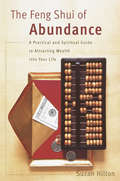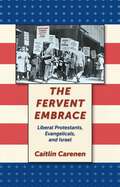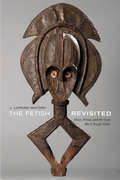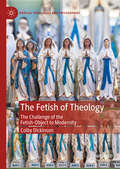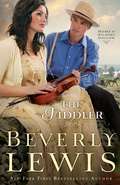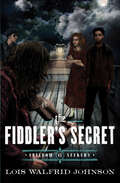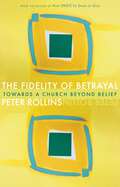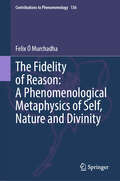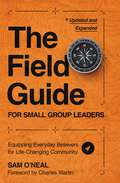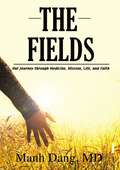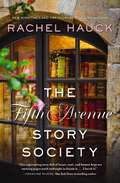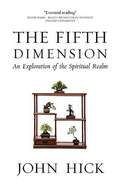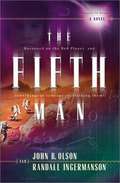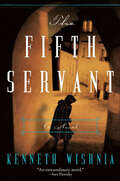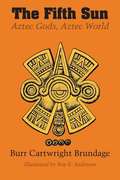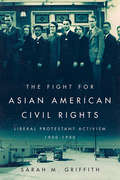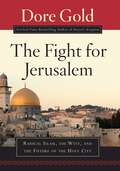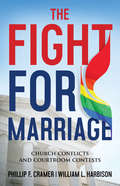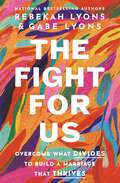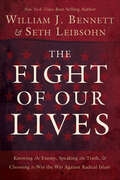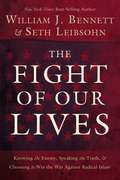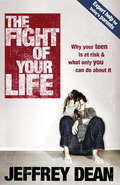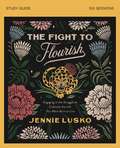- Table View
- List View
The Feng Shui of Abundance: A Practical and Spiritual Guide to Attracting Wealth into Your Life
by Suzan HiltonMoney is more than a bank balance; it's a reflection of the overall abundance in your life. Now, a CPA and feng shui practitioner presents an unusual and valuable application of the ancient Eastern tradition of feng shui. Delving into all of the life forces that affect financial health, The Feng Shui of Abundance is not just a monetary makeover; it is a whole-being program whose benefits include: ·Locating the wealth area of your office or home ·Dislodging clogged energy in your career ·Drawing on the ...
The Fervent Embrace: Liberal Protestants, Evangelicals, and Israel
by Caitlin CarenenWhen Israel declared its independence in 1948, Harry Truman issued a memo recognizing the Israeli government within eleven minutes. Today, the U.S. and Israel continue on as partners in an at times controversial alliance—an alliance, many argue, that is powerfully influenced by the Christian Right. In The Fervent Embrace, Caitlin Carenen chronicles the American Christian relationship with Israel, tracing first mainline Protestant and then evangelical support for Zionism.In the aftermath of the Holocaust, American liberal Protestants argued that America had a moral humanitarian duty to support Israel. Christian anti-Semitism had helped bring about the Holocaust, they declared, and so Christians must help make amends. Moreover, a stable and democratic Israel would no doubt make the Middle East a safer place for future American interests. Carenen argues that it was this mainline Protestant position that laid the foundation for the current evangelical Protestant support for Israel, which is based primarily on theological grounds.Drawing on previously unexplored archival material from the Central Zionist Archives in Israel, this volume tells the full story of the American Christian-Israel relationship, bringing the various “players”—American liberal Protestants, American Evangelicals, American Jews, and Israelis—together into one historical narrative.
The Fetish Revisited: Marx, Freud, and the Gods Black People Make
by J. Lorand MatorySince the early-modern encounter between African and European merchants on the Guinea Coast, European social critics have invoked African gods as metaphors for misplaced value and agency, using the term “fetishism” chiefly to assert the irrationality of their fellow Europeans. Yet, as J. Lorand Matory demonstrates in The Fetish Revisited, Afro-Atlantic gods have a materially embodied social logic of their own, which is no less rational than the social theories of Marx and Freud. Drawing on thirty-six years of fieldwork in Africa, Europe, and the Americas, Matory casts an Afro-Atlantic eye on European theory to show how Marx’s and Freud’s conceptions of the fetish both illuminate and misrepresent Africa’s human-made gods. Through this analysis, the priests, practices, and spirited things of four major Afro-Atlantic religions simultaneously call attention to the culture-specific, materially conditioned, physically embodied, and indeed fetishistic nature of Marx’s and Freud’s theories themselves. Challenging long-held assumptions about the nature of gods and theories, Matory offers a novel perspective on the social roots of these tandem African and European understandings of collective action, while illuminating the relationship of European social theory to the racism suffered by Africans and assimilated Jews alike.
The Fetish of Theology: The Challenge of the Fetish-Object to Modernity (Radical Theologies and Philosophies)
by Colby DickinsonBy delving into the history of the fetish-object among both modern and contemporary commentators, this book highlights the fetish-object’s role as a philosophical and religious concept of the highest significance. Historically, fetishes are implicated in specific struggles for sovereign (political) and/or religious (hierarchical) power, with their interwoven symbols defined as the primary location for transcendence in our world. This book defines the political consequences of fetish-objects within a western cultural, and primarily theological context through a comparative approach of various literatures on fetish-objects—anthropological to the psychological, Marxist to the theological. It reconceives of fetishes as a form of resistance to oppressive structures, something which motivated Christians themselves historically, and shaped our western understanding of the sacraments far more than has been acknowledged. Taking up this conversation likewise holds forth the possibility of reconceptualizing how fetish-objects and sacramental presences both speak profoundly to our late-modern selves.
The Fiddler (Home to Hickory Hollow #1)
by Beverly LewisWhen Amy DeVries, thoroughly modern and disillusioned, sets out on a road trip, she unexpectedly meets an Amishman--and community--that changes her life forever.
The Fiddler's Secret (Freedom Seekers #6)
by Lois Walfrid JohnsonWhen winter draws near, how will the Christina escape the untimely, fast-approaching ice storm? In the dark of night come the rapid strokes of the ship's bell, dense fog, and the slap of paddlewheels against water--and then the whistle screams a warning. A steamboat's coming too fast, too close. Run! Out of the darkness and danger come the piercing notes of a gifted fiddler. His face seems to hold a secret. What is the fiddler's challenge for the Freedom Seekers of every place and time? How will the Freedom Seekers answer Captain Norstad's questions: "What is most important to you? What do you really want?" From the golden age of steamboats, the rush of immigrants to new lands, and the dangers of the Underground Railroad come true-to-life stories of courage, integrity, and suspense in the Freedom Seekers series.
The Fiddler's Secret (Freedom Seekers #6)
by Lois Walfrid JohnsonWhen winter draws near, how will the Christina escape the untimely, fast-approaching ice storm?In the dark of night come the rapid strokes of the ship&’s bell, dense fog, and the slap of paddlewheels against water—and then the whistle screams a warning. A steamboat&’s coming too fast, too close. Run!Out of the darkness and danger come the piercing notes of a gifted fiddler. His face seems to hold a secret. What is the fiddler&’s challenge for the Freedom Seekers of every place and time?How will the Freedom Seekers answer Captain Norstad&’s questions: &“What is most important to you? What do you really want?&” From the golden age of steamboats, the rush of immigrants to new lands, and the dangers of the Underground Railroad come true-to-life stories of courage, integrity, and suspense in the Freedom Seekers series.
The Fiddler's Secret (Freedom Seekers #6)
by Lois Walfrid JohnsonWhen winter draws near, how will the Christina escape the untimely, fast-approaching ice storm?In the dark of night come the rapid strokes of the ship&’s bell, dense fog, and the slap of paddlewheels against water—and then the whistle screams a warning. A steamboat&’s coming too fast, too close. Run!Out of the darkness and danger come the piercing notes of a gifted fiddler. His face seems to hold a secret. What is the fiddler&’s challenge for the Freedom Seekers of every place and time?How will the Freedom Seekers answer Captain Norstad&’s questions: &“What is most important to you? What do you really want?&” From the golden age of steamboats, the rush of immigrants to new lands, and the dangers of the Underground Railroad come true-to-life stories of courage, integrity, and suspense in the Freedom Seekers series.
The Fidelity of Betrayal: Towards a Church Beyond Belief
by Peter Rollins"In The Fidelity of Betrayal, Peter Rollins has teased out—as Bonhoeffer never had the chance to do—profound possibilities hidden in the phrase. As a huge fan of Peter's first book, I find his second no less thoughtful, stimulating, and at times unsettling—always in a most (de)constructive way. His subversive parables, his clever turns of phrase, and his beguiling clarity all conspire to tempt the reader into that most fertile and terrifying of activities—to think to the very rim of one's understanding, and then to faithfully imagine the Truth that lies far beyond." —Brian McLaren, author/activist (www.brianmclaren.net) What if one of the core demands of a radical Christianity lay in a call for its betrayal, while the ultimate act of affirming God required the forsaking of God? And what if fidelity to the Judeo-Christian Scriptures demanded their renunciation? In short, what would it mean if the only way of finding real faith involved betraying it with a kiss?Employing the insights of mysticism and deconstructive theory, The Fidelity of Betrayal delves into the subversive and revolutionary nature of a Christianity that dwells within the church while simultaneously undermining it.
The Fidelity of Reason: A Phenomenological Metaphysics of Self, Nature and Divinity (Contributions to Phenomenology #136)
by Felix Ó MurchadhaThe book reveals a phenomenological metaphysics, which places it at the cutting edge of contemporary work on phenomenology. It addresses the crisis of world that is all around us as the meaning structures relating to self, nature and divinity all seem to be undermined politically and socially within the current reality of climatic, geo-political and ideology turmoil. In addressing these issues, this text argues for a renewed understanding of reason as a fidelity to world understood as faithfulness to the being and value of self, nature and divinity. The account of the self engages with contemporary and older phenomenological discussions (Husserl, Heidegger, Ricoeur, Henry, Zahavi) as well as debates in the Philosophy of Mind; the account of nature ranges over Schelling’s Naturphilosophie, Whitehead, Philosophy of Quantum Physics and Bruno Latour; the section on divinity engages with debates in Anthropology and the History of Religion as well as within the so-called ‘theological turn’ and theological discussions of ecology. This book is directed at scholars working within the fields of phenomenology, philosophy of nature, philosophy of self, philosophical theology, philosophy of religion and metaphysics as well as upper undergraduate and graduate students in philosophy, ecological studies and theology.
The Field Guide for Small Group Leaders: Equipping Everyday Believers for Life-Changing Community
by Sam O'NealThe Field Guide for Small Group Leaders provides basic training and support to help small group leaders succeed in the critical mission of leading others toward spiritual growth and transformation.The premise of serving as a small group leader sounds simple: Invite people to join you in studying the Bible. But the real-world implications of that role are incredibly complex. Today's small group leaders are asked to function as semi-experts in theology, psychology, evangelism, worship, apologetics, counseling, education, and nutrition--all in service to God and His church. Most of today's group leaders receive little or no training on how to carry out this important work. They are told to "Go and make disciples," then left to figure out the details on their own.Sam O'Neal (a small group leader himself), wrote The Field Guide for Small Group Leaders to help fellow leaders navigate this confusion and map out a plan for successful, transformational, and rewarding meetings. The Field Guide provides helpful information on:Curriculum and planning.Learning styles.Icebreakers and learning activities.Crafting discussion questions.Worship and prayer.What to do when things don't go as planned.And more.Whether you lead a small group, life group, or Sunday school class, this guide will give you confidence and practical tools for fostering meaningful connections, genuine community, and spiritual growth that so many are desperate for.
The Fields: Our Journey through Medicine, Mission, Life, and Faith
by Manh DangThe Fields is a Christian inspirational book written by a cancer doctor that discusses the challenges of life, especially from the medical perspective, the beauty of God's creation and human relationships, the need to care for the least among us through mission works and appreciation for the simple gifts of life. 100% OF THE PROCEEDS OF THIS BOOK WILL BE DONATED TO: 1. The Russell Hill Cancer Foundation (to aid poor and/or uninsured cancer patients in and around North Alabama). 2. Project Abundant Life (a transitional housing ministry for single moms in Madison County, Alabama). 3. Bessong Ministries (to aid poor and/or divorced, downtrodden people in North Alabama, and hospital and cancer center chaplaincy). 4. Until They Know Ministry (a ministry for poor Haitians and Dominicans in and around Puerto Plata, the Dominican Republic). 5. Desert Rose Ministries (ministries to rescue girls from forced marriages, FGM, and to reach the unreached people in Kenya, Africa). 6. Kenya Relief (a ministry to rescue, house and educate orphans, and to provide medical care for the poor people in Migori, Kenya, Africa).
The Fifth Avenue Story Society
by Rachel HauckAn invitation to join The Fifth Avenue Story Society gives five New York strangers a chance to rewrite their own stories.Executive assistant Lexa is eager for a much-deserved promotion, but her boss is determined to keep her underemployed.Literature professor Jett is dealing with a broken heart, as well as a nagging suspicion his literary idol, Gordon Phipps Roth, might be a fraud.Uber driver Chuck just wants a second chance with his kids.Aging widower Ed is eager to write the true story of his incredible marriage.Coral, queen of the cosmetics industry, has broken her engagement and is on the verge of losing her great grandmother&’s multimillion-dollar empire.When all five New Yorkers receive an anonymous, mysterious invitation to the Fifth Avenue Story Society, they suspect they&’re victims of a practical joke. No one knows who sent the invitations or why. No one has heard of the literary society. And no one is prepared to reveal their deepest secrets to a roomful of strangers.Yet curiosity and loneliness bring them back week after week to the old library. And it&’s there they discover the stories of their hearts, and the kind of friendship and love that heals their souls.
The Fifth Dimension: An Exploration of the Spiritual Realm
by John HickDrawing on mystical and religious traditions ancient and modern, and spiritual thinkers as diverse as Julian of Norwich and Mahatma Gandhi, The Fifth Dimension is John Hick's eloquent argument for a more complete reality, in which a fifth, spiritual dimension plays a central role. Taking into account recent global crises - including the 9/11 attacks and war in Iraq - Hick addresses a variety of timeless issues, from the validity of religious experience to the science versus religion debate.
The Fifth Man (Oxygen Series, #2)
by Randall Ingermanson John B. OlsonThe sequel to the award-winning Oxygen. Courage and self-sacrifice have finally brought the crew of Ares 10 safely to the planet Mars. They enthusiastically begin the mission they were sent to perform. Though working under dangerous conditions and experiencing strained relationships, the astronauts are encouraged by fascinating discoveries that seem to point to the presence of microscopic life on the planet. But their work is disrupted when frightening sabotage, like that of the trip to Mars, begins again. Is the "fifth man" alien or human? In this exciting sequel to Christie-award winning "Oxygen," high-stakes action, fascinating characters, and exciting romance will captivate both male and female readers.
The Fifth Servant: A Novel
by Kenneth J. WishniaWhoever saves a single life saves the entire world . . .In 1592, as the Catholic Church and the Protestants battle for control of the soul of Europe, Prague is a relatively safe harbor in the religious storm. Ruled by Emperor Rudolph II, the city is a refuge for Jews who live within the gated walls of its ghetto. But their lives are jeopardized when a young Christian girl is found with her throat slashed in a Jewish shop on the eve of Passover. Charged with blood libel, the shopkeeper and his family are arrested. All that stands in the way of a rabid Christian mob is a clever Talmudic scholar, newly arrived from Poland, named Benyamin Ben-Akiva. Pleading the shopkeeper's innocence to the city's sheriff, Benyamin is given three days to bring the true killer to justice. But the search will not be easy. Hampered by rabbinic law, and with no allies or connections, Benyamin has only his wits, knowledge, and faith to guide him on his quest—a trail that weaves from the city's teeming streets to the quiet of a shul, from the forbidden back rooms of a ghetto brothel to the emperor's lavish palace. The Talmud says many things in life depend on mazl, luck. Fortunately, Benyamin is blessed, for an unlikely group of heroes will risk their own lives to help him discover the truth: Anya, a Christian butcher's daughter; the renowned reformist rabbi Judah Loew; a wise herbal healer known as Kassandra the Bohemian; and even the emperor himself.Who would most profit from the girl's murder—and from having the entire ghetto sealed off? Is the killer a Christian indebted to the girl's apothecary father? Or a messianic Jew bent on the destruction of his people to precipitate the Messiah's coming? The desperate search for answers is complicated by the arrival of a new Holy Inquisitor determined to root out witchcraft and heresy, and reclaim the fractious Bohemian territory for Rome. With time running out, Benyamin must dare the impossible—and commit the unthinkable—to save the Jews of Prague . . . and his own life.Infused with history and spiritual insight, rich in atmosphere and color, The Fifth Servant vividly re-creates sixteenth-century Prague—a bustling city where superstition, ignorance, and hatred clash with curiosity, knowledge, and tolerance; a world in which innocent lives are swept away by political and religious struggles, and righteous men and women sacrifice everything in the name of justice and truth.
The Fifth Sun: Aztec Gods, Aztec World
by Burr Cartwright BrundageThe ancient Aztecs dwelt at the center of a dazzling and complex cosmos. From this position they were acutely receptive to the demands of their gods. The Fifth Sun represents a dramatic overview of the Aztec conception of the universe and the gods who populated it-Quetzalcoatl, the Plumed Serpent; Tezcatlipoca, the Smoking Mirror; and Huitzilopochtli, the Southern Hummingbird. Burr Cartwright Brundage explores the myths behind these and others in the Aztec pantheon in a way that illuminates both the human and the divine in Aztec life. The cult of human sacrifice is a pervasive theme in this study. It is a concept that permeated Aztec mythology and was the central preoccupation of the aggressive Aztec state. Another particularly interesting belief explored here is the "mask pool," whereby gods could exchange regalia and, thus, identities. This vivid and eminently readable study also covers the use of hallucinogens; cannibalism; the calendars of ancient Mexico; tlachtli, the life-and-death ball game; the flower wars; divine transfiguration; and the evolution of the war god of the Mexica. A splendid introduction to Aztec religion, The Fifth Sun also contains insights for specialists in ethnohistory, mythology, and religion.
The Fight for Asian American Civil Rights: Liberal Protestant Activism, 1900-1950
by Sarah M GriffithFrom the early 1900s, liberal Protestants grafted social welfare work onto spiritual concerns on both sides of the Pacific. Their goal: to forge links between whites and Asians that countered anti-Asian discrimination in the United States. Their test: uprooting racial hatreds that, despite their efforts, led to the shameful incarceration of Japanese Americans in World War II. Sarah M. Griffith draws on the experiences of liberal Protestants, and the Young Men's Christian Association in particular, to reveal the intellectual, social, and political forces that powered this movement. Engaging a wealth of unexplored primary and secondary sources, Griffith explores how YMCA leaders and their partners in the academy and distinct Asian American communities labored to mitigate racism. The alliance's early work, based in mainstream ideas of assimilation and integration, ran aground on the Japanese exclusion law of 1924. Yet their vision of Christian internationalism and interracial cooperation maintained through the World War II internment trauma. As Griffith shows, liberal Protestants emerged from that dark time with a reenergized campaign to reshape Asian-white relations in the postwar era.
The Fight for Jerusalem: Radical Islam, The West, And The Future Of The Holy City
by Dore GoldJerusalem under SiegeIn The Fight for Jerusalem, bestselling author and former Israeli ambassador to the United Nations Dore Gold explains why radical Islamists seek to divide and conquer Jerusalem and raze sites holy for Christians, Jews, and Muslims. With the United Nations untrustworthy and global jihad making waves, the city is a ticking time bomb. Gold shows why only Israel can preserve its sanctuaries for different religions and why uncovering Jerusalem's past and biblical truths prove crucial to saving it.
The Fight for Marriage: Church Conflicts and Courtroom Contests
by Phillip F. Cramer William L. HarbisonFor leaders in governments and in churches, marriage equality is the most contentious civil-rights dispute in the 21st century. During an era where nearly half of all marriages end in divorce, same-gender couples now have the federal civil right to marry, too. The churches are therefore coming to terms with whether to recognize and affirm these faithful partnerships as sacred covenants. Attorneys Harbison and Cramer, faithful and active members of a United Methodist congregation, brought one of the cases to the US Supreme Court, which resulted in the 2015 landmark decision that permits persons of the same gender to marry. They bring a unique legal and cultural perspective to the controversy. For the three couples Harbison and Cramer represented, marriage is not an "issue" to be resolved. Marriage is rather a sign for these couples of their faithful promise to love each other until they depart this life. "Each couple married for several reasons, including their commitment to love and support one another, to demonstrate their mutual commitment to their family, friends, and colleagues, and to show others that they should be treated as a family. They also married to make a legally binding mutual commitment, to join their resources together in a legal unit, and to be treated by others as a legal family unit, rather than as legally unrelated individuals. Finally, each couple married so that they could access the legal responsibilities of marriage to protect themselves and their families, just as heterosexual couples do." Aleta A. Trauger, Federal Judge With a first-hand account of the respectful courtroom drama concerning marriage in American communities and states, Harbison and Cramer show why states care about marriage, why the church got involved in marriage more than a thousand years after Jesus's earthly ministry, and how the church and the state function in partnership to foster the purposes and social benefits of marriage. From the Faultlines collection, resources intended to inform conversations around human sexuality and the church.
The Fight for Us: Overcome What Divides to Build a Marriage That Thrives
by Gabe Lyons Rebekah LyonsAn insightful, powerful path forward for couples, whether you're in a struggling marriage or simply looking for ways to enhance and strengthen your relationship.Marriage is hard for all kinds of reasons--financial struggles, parenting styles, personality differences, difficult circumstances. It's easy to drift apart, walking through life more as roommates than partners. But there's so much more for your marriage. The Fight for Us offers biblical wisdom and encouragement, as well as practical guidance, that will give you the confidence you need to cultivate the happy and healthy marriage you long for.Rebekah and Gabe Lyons shepherd you as ones who have been there--many times--in their twenty-seven-year marriage, while also drawing on their mental-health coaching and marriage-counseling expertise to help you breathe new life into your marriage. The Fight for Us will guide you to:Discover why you fight, how you fight, and how to overcome toxic patterns to fight wellRenew your commitment to love, care for, and show grace to your spouseRelinquish coping mechanisms and/or addictions that have come between youUnderstand your spouse's needs while still validating your ownEstablish goals and rhythms that will deepen your friendship and intimacy as a coupleAnd, most of all, lean on the One who fights for you and your marriage Whatever your reason for fighting for your marriage, The Fight for Us covers it all: community, health, money, parenting, career, sex, conflict, and spirituality. Your journey toward a growing, healthy, thriving marriage starts here.
The Fight of Our Lives: Knowing the Enemy, Speaking the Truth, & Choosing to Win the War Against Radical Islam
by William J. Bennett Seth Leibsohn“This bold and readable book makes a powerful, if controversial, case against appeasing terrorists and those who support them.” —Alan DershowitzTen years ago, when radical Islamist terrorists used three U.S. airplanes to kill nearly three thousand of our countrymen, America was angry. It was a focused and justified anger—one that generated clear objectives and a willingness to meet them. But that resolve has deteriorated so much that many of our nation’s top political and military leaders will scarcely utter the word that brought us here, “terrorism,” let alone the ideology that fuels it, “radical Islam.”In The Fight of Our Lives, William J. Bennett and Seth Leibsohn examine the devolution of America’s post-9/11 tenacity and how this country’s well-meaning culture of religious tolerance, coupled with soft and apologetic political leadership, has placed us squarely in the pocket of radical Islamists who have made clear their intention to obliterate everything we value.America’s devotion to political correctness has crippled its ability to accurately interpret and respond to the motives of its fiercest enemies. Unless we change course and re-engage the fight, the costs of our tolerance will prove tragic and immeasurable.The Fight of Our Lives helps readers refocus, to reframe and understand the threats we face.By surveying and explaining the current scene, Bennett and Leibsohn point the way to a future in which our enemies are properly acknowledged and firmly opposed.“Many have forgotten the mortal threat to America that is radical Islam. Bennett and Leibsohn explain why we must wake up and what we need to do.” —Mark Levin, talk-show host and #1 New York Times–bestselling author
The Fight of Our Lives: Knowing the Enemy, Speaking the Truth, and Choosing to Win the War Against Radical Islam
by William J. Bennett Seth LeibsohnTen Years Ago, when radical Islamist terrorists used three U.S. airplanes to kill nearly three thousand of our countrymen, America was angry. It was a focused and justified anger; one that generated clear objectives and a willingness to meet them. But that resolve has deteriorated so much that many of our nation's top political and military leaders will scarcely utter the word that brought us here, "terrorism," let alone the ideology that fuels it, "radical Islam." In The Fight of Our Lives, William J. Bennett and Seth Leibsohn examine the devolution of America's post-9/11 tenacity and how this country's well-meaning culture of religious tolerance, coupled with soft and apologetic political leadership, has placed us squarely in the pocket of radical Islamists who have made clear their intention to obliterate everything we value. America's devotion to political correctness has crippled its ability to accurately interpret and respond to the motives of its fiercest enemies. Unless we change course and re-engage the fight, the costs of our tolerance will prove tragic and immeasurable. The Fight of Our Lives helps readers refocus, to reframe and understand the threats we face. By surveying and explaining the current scene, Bennett and Leibsohn point the way to a future in which our enemies are properly acknowledged and firmly opposed.
The Fight of Your Life: Why your teen is at risk & what only you can do about it
by Jeffrey DeanNo generation in history has faced anything like the incredible onslaught of destructive influences attacking todays teens. On every sideon the Web, in music and media, from their own peerstoday's world seems bent on destroying our young people.
The Fight to Flourish Bible Study Guide: Engaging in the Struggle to Cultivate the Life You Were Born to Live
by Jennie LuskoGod Never Promises It&’s Going to Be Easy, But He Promises He&’ll Always Be There.Just like some plants need darkness to grow, many of us grow stronger in our faith in the dark and difficult times. It is in the sacred space of pain and promise that we begin to flourish. In this six-session video Bible study, Jennie Lusko offers biblical hope in your struggles through personal and vulnerable examples of God not only helping her survive the darkness but thrive in it.Fighting and flourishing are meant to blend together. God can help you make the most out of your struggle because a flourishing life in every season is worth fighting for.Jennie&’s study includes video teaching, group discussion, and space to dig deeper. You&’ll be strengthened in dark times, encouraged where you are, and reminded you never fight alone. A fresh and thriving life is waiting for you.Sessions include:The Fight in the DarkDon&’t Bloom Where You&’re PlantedReady, Set, Live!The Art of Living BeautifullyShake Up Your LifeYou Don&’t Fight AloneDesigned for use with The Fight to Flourish Video Study available on DVD or streaming video, sold separately.
